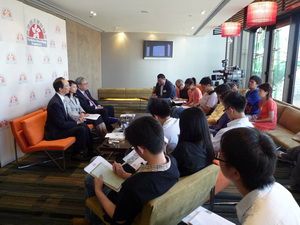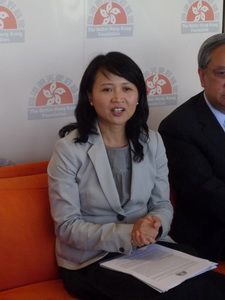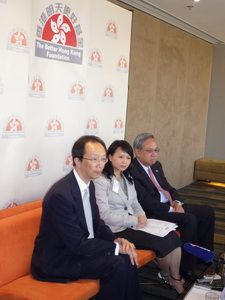The Better Hong Kong Foundation (“the Foundation”) organised its annual delegation to the United States from 23 to 29 April this year. Led by the Foundation’s Executive Director Ms. Karen Tang, members of this year’s delegation included guest speaker Mr. Antony Leung, Chairman of Greater China, the Blackstone Group (HK) Ltd and former Financial Secretary of HKSAR; and two Foundation’s Council Members Ms. Winnie Ng, Director of the Kowloon Motor Bus Co. Ltd and Mr. Albert Ip, International Advisory Council Asia of Washington University, St. Louis. A press conference was held on 5 May 2009 to brief members of the local media about the main issues dealt with during their stay in the U.S. Ms. Karen Tang, Mr. Antony Leung and Mr. Albert Ip shared their observations and experiences gained from the trip on the occasion.
Ms. Karen Tang said, “The main purpose of the delegation was to provide an annual update about Hong Kong’s present situation, to share our perspectives on the developments in China, and to exchange views with the interlocutors in the United States and gauge the temperature in the Beltway their views on the developments in Hong Kong, China, U.S. and the China-US relationship especially under the new Obama administration.”
Mr. Antony Leung said the interlocutors in U.S. basically understood and agreed that the proximity to China, low tax rate and simple tax regime, legal and regulatory systems that predictable and consistent, and accepted by international investors, freedom of information, safe and convenient place to life and work are fundamental competitive edges of Hong Kong. Regarding the announcement of Shanghai to be an international financial center in 2020, he expressed that with such a huge size of economy, it is sufficient for China to have more than one international financial center. The U.S. also has a few financial centers such as New York, Chicago and San Francisco. Being an international financial center, Hong Kong should further strengthen its existing advantages, strive to be the global offshore Renminbi center and regional center for derivatives, develop its business in Renminbi bonds as well as other well-regulated financial instruments. Hong Kong and Shanghai could achieve a win-win situation. However, to have a long-term and sustainable development, it is crucial for Hong Kong to attract and retain more talents around the world to work and live here. Moreover, Mr. Leung proactively explained to the U.S. that Hong Kong is not a “tax haven” and expressed our concerns about the possible rise of protectionism (no matter on trade, human resources, capital flow, etc) that may caused by further downturn of the world economy. The U.S. promised that they would keep a close watch on the development of these issues.
Ms. Karen Tang concurred that there was not much concern over Hong Kong. People in the U.S. were more concerned of their local economic issues and how to better engage China, hence there was much more interest in knowing if and how China can maintain 8% GDP growth and the impact of its economic stimulus package. “However, we do share our belief that with the increasing importance of China as a global economic powerhouse, the proximity of Hong Kong to the Mainland and the strong support from the Central Authority to Hong Kong, Hong Kong definitely can benefit and can rebound faster.”, said Miss Tang. Overall, people are positive in the China-US relationship and the direction that the new U.S. Administration is driving at.
Mr. Albert Ip emphasized the importance of the quality of human capital to the success of Hong Kong. He thought that it was crucial for university faculty members and students to have strong international skills and exposure, hence there should be more joint programs and exchanges arranged between universities in the U.S. and Hong Kong. He quoted the example of a joint program between Hong Kong Polytechnic University and Washington University in St. Louis. “The world is getting smaller, and there is much more interaction and interdependency”, said Mr. Ip. Universities in Hong Kong aim to get the best talents from the world, including the recently hired Chancellors at the Hong Kong University of Science and Technology and Hong Kong Polytechnic University who came from the U.S., where they held important positions at prestigious universities before the appointments. Having leaders with western academic background and experience will further build on the reputation and quality of local universities in Hong Kong.
Ms. Winnie Ng commented that the meetings with leaders from the political and business sectors in U.S. during the mission and the participation in activities of the Committee of 100 and Hong Kong-United State Business Council held concurrently in Washington D.C. have provided excellent platforms for ideas exchange and communications. She was gratified to see that the Foundation played a contributory role as a non-government diplomat to promote mutual understanding between Hong Kong, China and U.S.

Around 20 journalists attending the press conference

The Foundation’s Executive Director Ms. Karen Tang giving a brief introduction on the delegation’s program

(L to R) Mr. Antony Leung (Guest speaker of the delegation), Ms. Karen Tang (Executive Director of the Foundation) and Mr. Albert Ip (Council Member of the Foundation)

